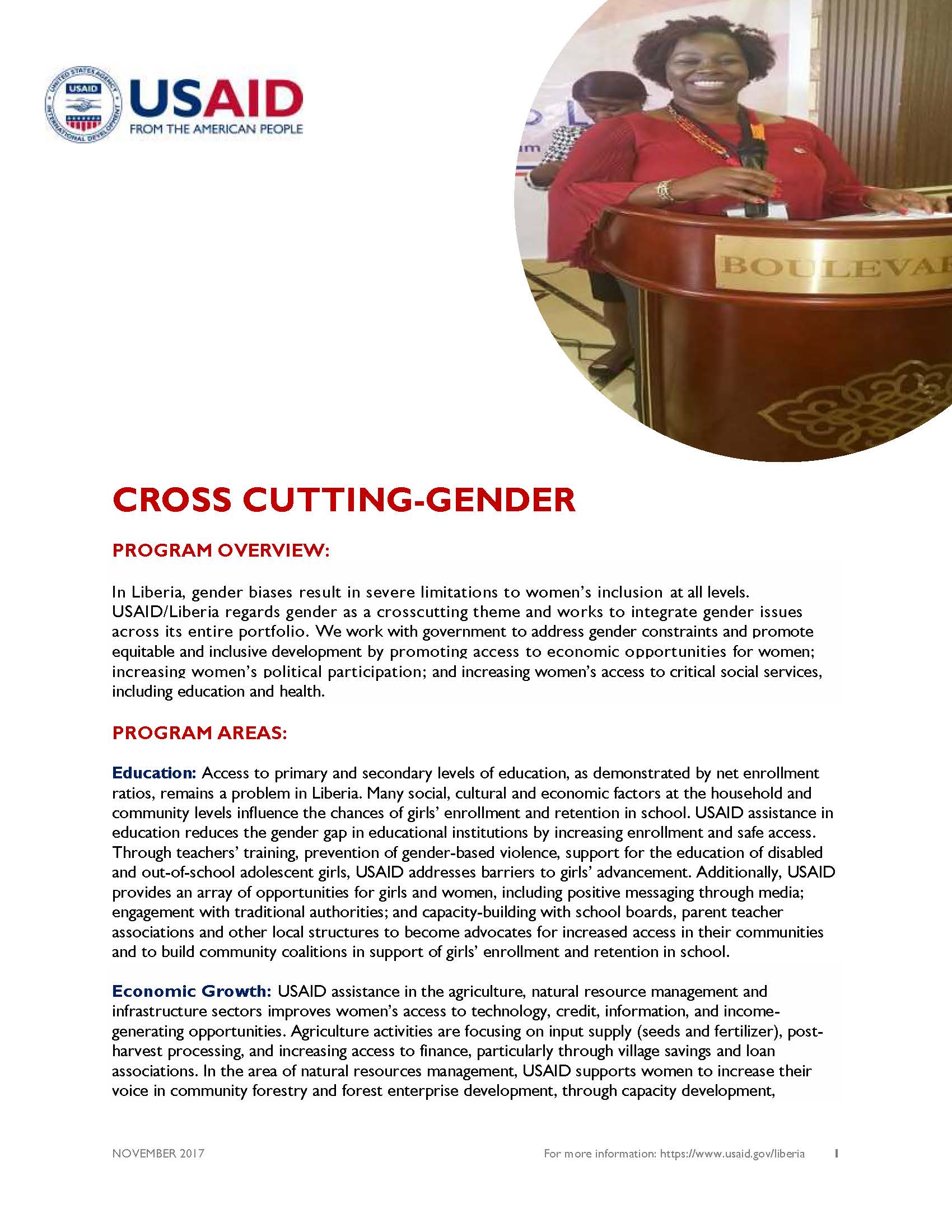Speeches Shim
Gender ![]() (docx - 246k)
(docx - 246k)
In Liberia, gender biases result in severe limitations to women’s inclusion at all levels. USAID/Liberia regards gender as a crosscutting theme and works to integrate gender issues across its entire portfolio. We work with government to address gender constraints and promote equitable and inclusive development by promoting access to economic opportunities for women; increasing women’s political participation; and increasing women’s access to critical social services, including education and health.
PROGRAM AREAS:
Education: Access to primary and secondary levels of education, as demonstrated by net enrollment ratios, remains a problem in Liberia. Many social, cultural and economic factors at the household and community levels influence the chances of girls’ enrollment and retention in school. USAID assistance in education reduces the gender gap in educational institutions by increasing enrollment and safe access. Through teachers’ training, prevention of gender-based violence, support for the education of disabled and out-of-school adolescent girls, USAID addresses barriers to girls’ advancement. Additionally, USAID provides an array of opportunities for girls and women, including positive messaging through media; engagement with traditional authorities; and capacity-building with school boards, parent teacher associations and other local structures to become advocates for increased access in their communities and to build community coalitions in support of girls’ enrollment and retention in school.
Economic Growth: USAID assistance in the agriculture, natural resource management and infrastructure sectors improves women’s access to technology, credit, information, and income-generating opportunities. Agriculture activities are focusing on input supply (seeds and fertilizer), post-harvest processing, and increasing access to finance, particularly through village savings and loan associations. In the area of natural resources management, USAID supports women to increase their voice in community forestry and forest enterprise development, through capacity development, advocacy support, and technical training. Similarly, through infrastructure activities, USAID is supporting the Ministry of Education and other partners in expanding the Liberia School for the Blind to include a separate dormitory and improved water, sanitation, and hygiene facilities for adolescent girls. Investments in rehabilitating rural roads reduce travel times by more than half for many women and girls, thereby allowing them to safely visit health clinics and attend school.
Health: Through its health programs, USAID improves the health status of women and girls by increasing access and availability of essential services through gender-specific messages. Liberia’s high rate of teen pregnancy is being addressed through awareness campaigns, radio spots and jingles as well as market-based distributions of contraceptives targeting adolescent girls. Additionally, family planning services will continue to focus on male involvement and adolescent reproductive health both at the community level and at health facilities. Through gender sensitive HIV/AIDS information, education, and communication materials, we aim to address the substantial gender gaps in knowledge of HIV transmission and prevention. By supporting reproductive, maternal, newborn, child health and nutrition services that are accessible, affordable, and high quality, USAID improves the health status of all Liberians, particularly women, and reduces maternal and child mortality.
Democracy and Governance: USAID integrates and focuses on gender and women’s empowerment through its democracy and governance programs. USAID supports government and civil society counterparts in their efforts to improve outreach to women, increase women’s participation in the political process, and enhance women’s roles in good governance. USAID also focuses its efforts to improve human and institutional capacity for gender responsive land governance policies. USAID supports media programs on gender sensitization and integration in the workplace, including mentoring to promote equitable work assignments and advancement to editorial and management positions.


Comment
Make a general inquiry or suggest an improvement.